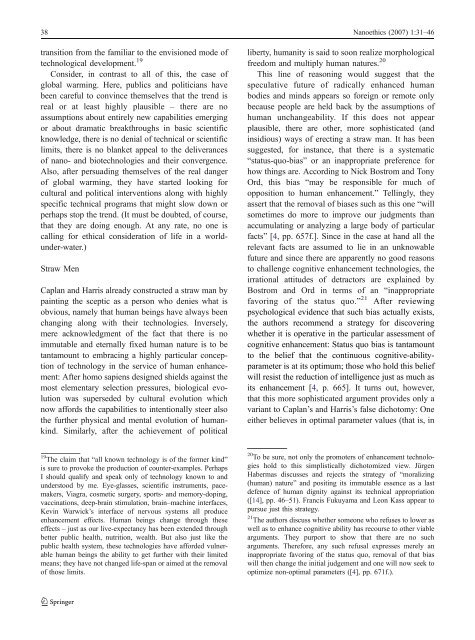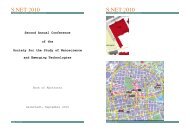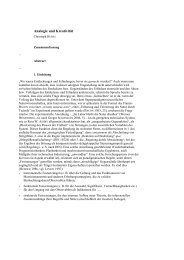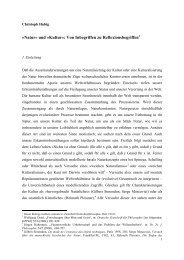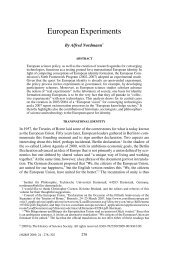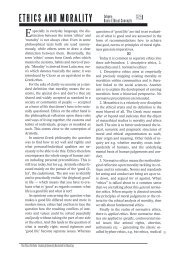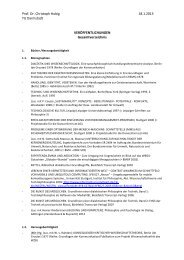If and Then: A Critique of Speculative NanoEthics - Common Sense ...
If and Then: A Critique of Speculative NanoEthics - Common Sense ...
If and Then: A Critique of Speculative NanoEthics - Common Sense ...
You also want an ePaper? Increase the reach of your titles
YUMPU automatically turns print PDFs into web optimized ePapers that Google loves.
38 Nanoethics (2007) 1:31–46<br />
transition from the familiar to the envisioned mode <strong>of</strong><br />
technological development. 19<br />
Consider, in contrast to all <strong>of</strong> this, the case <strong>of</strong><br />
global warming. Here, publics <strong>and</strong> politicians have<br />
been careful to convince themselves that the trend is<br />
real or at least highly plausible – there are no<br />
assumptions about entirely new capabilities emerging<br />
or about dramatic breakthroughs in basic scientific<br />
knowledge, there is no denial <strong>of</strong> technical or scientific<br />
limits, there is no blanket appeal to the deliverances<br />
<strong>of</strong> nano- <strong>and</strong> biotechnologies <strong>and</strong> their convergence.<br />
Also, after persuading themselves <strong>of</strong> the real danger<br />
<strong>of</strong> global warming, they have started looking for<br />
cultural <strong>and</strong> political interventions along with highly<br />
specific technical programs that might slow down or<br />
perhaps stop the trend. (It must be doubted, <strong>of</strong> course,<br />
that they are doing enough. At any rate, no one is<br />
calling for ethical consideration <strong>of</strong> life in a worldunder-water.)<br />
Straw Men<br />
Caplan <strong>and</strong> Harris already constructed a straw man by<br />
painting the sceptic as a person who denies what is<br />
obvious, namely that human beings have always been<br />
changing along with their technologies. Inversely,<br />
mere acknowledgment <strong>of</strong> the fact that there is no<br />
immutable <strong>and</strong> eternally fixed human nature is to be<br />
tantamount to embracing a highly particular conception<br />
<strong>of</strong> technology in the service <strong>of</strong> human enhancement:<br />
After homo sapiens designed shields against the<br />
most elementary selection pressures, biological evolution<br />
was superseded by cultural evolution which<br />
now affords the capabilities to intentionally steer also<br />
the further physical <strong>and</strong> mental evolution <strong>of</strong> humankind.<br />
Similarly, after the achievement <strong>of</strong> political<br />
liberty, humanity is said to soon realize morphological<br />
freedom <strong>and</strong> multiply human natures. 20<br />
This line <strong>of</strong> reasoning would suggest that the<br />
speculative future <strong>of</strong> radically enhanced human<br />
bodies <strong>and</strong> minds appears so foreign or remote only<br />
because people are held back by the assumptions <strong>of</strong><br />
human unchangeability. <strong>If</strong> this does not appear<br />
plausible, there are other, more sophisticated (<strong>and</strong><br />
insidious) ways <strong>of</strong> erecting a straw man. It has been<br />
suggested, for instance, that there is a systematic<br />
“status-quo-bias” or an inappropriate preference for<br />
how things are. According to Nick Bostrom <strong>and</strong> Tony<br />
Ord, this bias “may be responsible for much <strong>of</strong><br />
opposition to human enhancement.” Tellingly, they<br />
assert that the removal <strong>of</strong> biases such as this one “will<br />
sometimes do more to improve our judgments than<br />
accumulating or analyzing a large body <strong>of</strong> particular<br />
facts” [4, pp. 657f.]. Since in the case at h<strong>and</strong> all the<br />
relevant facts are assumed to lie in an unknowable<br />
future <strong>and</strong> since there are apparently no good reasons<br />
to challenge cognitive enhancement technologies, the<br />
irrational attitudes <strong>of</strong> detractors are explained by<br />
Bostrom <strong>and</strong> Ord in terms <strong>of</strong> an “inappropriate<br />
favoring <strong>of</strong> the status quo.” 21 After reviewing<br />
psychological evidence that such bias actually exists,<br />
the authors recommend a strategy for discovering<br />
whether it is operative in the particular assessment <strong>of</strong><br />
cognitive enhancement: Status quo bias is tantamount<br />
to the belief that the continuous cognitive-abilityparameter<br />
is at its optimum; those who hold this belief<br />
will resist the reduction <strong>of</strong> intelligence just as much as<br />
its enhancement [4, p. 665]. It turns out, however,<br />
that this more sophisticated argument provides only a<br />
variant to Caplan’s <strong>and</strong> Harris’s false dichotomy: One<br />
either believes in optimal parameter values (that is, in<br />
19 The claim that “all known technology is <strong>of</strong> the former kind”<br />
is sure to provoke the production <strong>of</strong> counter-examples. Perhaps<br />
I should qualify <strong>and</strong> speak only <strong>of</strong> technology known to <strong>and</strong><br />
understood by me. Eye-glasses, scientific instruments, pacemakers,<br />
Viagra, cosmetic surgery, sports- <strong>and</strong> memory-doping,<br />
vaccinations, deep-brain stimulation, brain–machine interfaces,<br />
Kevin Warwick’s interface <strong>of</strong> nervous systems all produce<br />
enhancement effects. Human beings change through these<br />
effects – just as our live-expectancy has been extended through<br />
better public health, nutrition, wealth. But also just like the<br />
public health system, these technologies have afforded vulnerable<br />
human beings the ability to get further with their limited<br />
means; they have not changed life-span or aimed at the removal<br />
<strong>of</strong> those limits.<br />
20 To be sure, not only the promoters <strong>of</strong> enhancement technologies<br />
hold to this simplistically dichotomized view. Jürgen<br />
Habermas discusses <strong>and</strong> rejects the strategy <strong>of</strong> “moralizing<br />
(human) nature” <strong>and</strong> positing its immutable essence as a last<br />
defence <strong>of</strong> human dignity against its technical appropriation<br />
([14], pp. 46–51). Francis Fukuyama <strong>and</strong> Leon Kass appear to<br />
pursue just this strategy.<br />
21 The authors discuss whether someone who refuses to lower as<br />
well as to enhance cognitive ability has recourse to other viable<br />
arguments. They purport to show that there are no such<br />
arguments. Therefore, any such refusal expresses merely an<br />
inappropriate favoring <strong>of</strong> the status quo, removal <strong>of</strong> that bias<br />
will then change the initial judgement <strong>and</strong> one will now seek to<br />
optimize non-optimal parameters ([4], pp. 671f.).


